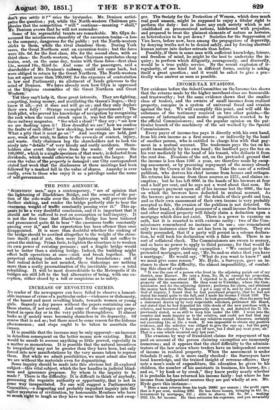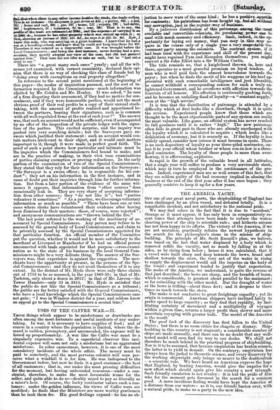INCOME-TAX EVASIONS.
TH.E evidence before the Select Committee on the Income-tax shows that the returns made by the higher merchant class are honourable and trustworthy ; but the same evidence shows that the smaller class of traders, and the owners of small incomes from realized property, conspire in a system of universal fraud and evasion against the tax. We will exemplify this point, and will add the substance of the testimony received on two other points,—the sources of information and modes of inquisition resorted to by the official Commissioners ; and the popular opinion on the par- ticular branch of the machinery of the act worked by the Special Commissioners.
Every payer of income-tax pays it directly with his own hand, from his own income as a first source ; or indirectly by the hand of another person, who is entitled to charge him with that pay- ment in a mutual account. The tradesman pays the tax on his profit immediately by his own hand ; the landlord pays the tax on. his rent mediately by the hand of his tenant, who deducts it from the rent due. Evasions of the act, on the pretended ground that the income is less than 1501. a year, are therefore made by
es -
ing assessment, or by procuring repayment of the money y taken by the Crown at its first source. Take the case of a retired publican, who derives his chief income from houses and °Wages. He returns his income from these sources as 1371., and elmins ex- emption; but he has left 600/. in the hands of his brewers at four and a half per cent, and he says not a word about that sum. He thus escapes payment upon all of his income but the 6001., the tax on which the brewers have deducted in mutual account. As the brewers give no account of the details of their profit and loss, and as their own assessment of their own income is very probably accepted as fair, the evasion of the publican is not detected. On the other hand, a dishonest possessor of a small income from houses and other realized property will falsely claim a deduction upon a mortgage which does not exist. There is a power to examine on oath, but it is resorted to with extreme rarity: two of the Com- missioners remembered no instance of its use ; one remembered only two instances since the act has been in operation. They are firmly persuaded, that if a party will persist in a solemn declara- tion, he will back his declaration with a false oath. There is no sort of collateral check. The Commissioners are sworn to secrecy, and so have no power to apply to third persons; for that would be exposing the party claiming exemption : " We cannot go to the pretended mortgagee, and say, ' Mr. So-and-so states that you have a mortgage.' He would say, What do you want to know ?' and we must give some reason.' Mr. Hyde, a Surveyor, gave an in= stance to show the difficulty, the almost impossibility, of combat- ing this class of evaders.
It was the case of a person who lived in the adjoining parish out of my district, near Harrow. He sent a form, No. 38, to exempt his properties, i
and made the income about 1461. I objected to it, and refused to strike the property of the assessment. He then went VA:abridge, where the Com- missioners met for the adjoining district; preferred his claim, and obtained the money back from the Boards. I got a copy of it, and by dint of a great deal of inquiry, I found that he had purchased property, that he had not stated his rental quite to the full, and I made his income I think 1531. The solicitor was directed to prosecute him ; he took proceedings ; then the party had a statement drawn up by very respectable solicitors, petitioned the Board, and stated that he had deposited his title-deeds of the new purchase with a relative, and borrowed 250/. temporarily upon it, and deducted the 71. 10s. previously stated, so as still to keep him under the 1501. I went into the country and made inquiry as to the relative, and could not find that any such person existed ; that he had any relatives except labourers, certainly not exceeding 148. or 15s. a week. It was impossible to obtain any positive evidence, and the solicitor was obliged to give the case up ; but the party states to the collector, have got off now, but I shall pay next year, sir. That is a case which occurred only last year." The evasions by way of fraudulent claims for repayment of tax paid on account of the person claiming exemption are immensely numerous ; and it appears that the chief difficulty to the adminis- trators of the law arises where traders have an independent source of income in realized property. When the assessment is under Schedule D only, it is more easily checked : the Surveyors have local knowledge, and the trained insight of revenue-officers ; they note a man's scale of expenditure the education he gives to his children, the number of his assistants in business, his horses, ; and so, " by hook or by crook," they know pretty nearly whether it is probable he has returned his income fairly : but where he has income from independent sources they are put wholly at sea. Mr. Hyde gave this instance- ' Here a man returns from his trade 26001. per annum ; the profit upon that is 8 per cent, making 2081. He has three houses, bringing in 411. 58.; investment by mortgage, 31/. ; ditto in shares, 121. 88. 84. ; makin; i 2921. 138. 8d. income. He then estimates his expenses, and you invariably
and..that-witen there litany other income beside& the tattle, the trade-suffers. This is an inshince : the abopman is put.down at. 454 ; a porter, 4W. ; 301. ; horse and cart, 501. ; gas, 101. ;laxes, 12/. ; repairs, 10/. ; bad debts, ; implements,
plements, 3/. insurance, 11.4s. ; rent, SU. That is to ray, the peeks of the trade areestimatedat-2021., and. the expenses of carrying it an at 2501.4s.. be he has ethernroperty which was timed up with it ; ao that, slowing an inowne of _Mil. 13s. 8d., he says it.ia 421.98. lid. Now. .I knew this man, who was carrying.on agreat business. I knew that he had a eon at a. boarding-school, and.knew that he could.not keep him there for 401. Therefore it was entered as a diegracefel ease. It was 'nogg/at-before the Local Commissioners ; and being the last imamate, never inning had a pro- secution, they merely adopted nay, view oef. the ,neett, Mt did not _wowed against him." That man did not offer to lake as oath, .bat lie "had nuts word to say." ' There are " a great many such cases " ',early ; and all the wit- nesses yet examined, with earnest unanimity, declared their opi- nion that there is no way of checking this class of frauds but by iA doing away with exemptions on real property altogether." In reference to the second point mentioned at the beginning of this paper—the modes of inquisition pursued, and the sort of in- formation required by the Commissioners—much information was elicited by Mr. Cobden and Mr. Henley. It was asked, " In case . df a firm disputing their assessment, if they had no motive for con- cealment, and if they were honourable parties, would not the most obvious proof of their real profits be a copy of their annual stock- taking, with the amount of profits realized and apportioned be- tween the partners, bearing their signatures, such as is common With all well-regulated firms at the end of each year?" The answer was, that such an account would notbe sufficient, even if accompanied by an offer of the inspection of the private ledger with the signa- ture of the parties. This excited surprise, and the inquiry was pushed into very searching details • but the Surveyors gave an- swers which justified their statement : such an account would con- tain matters irrelevant to their object, and it would omit matters important to it, though it were made in perfect good faith. The proof of such a point shows how particular and intimate must be the inquiries which the Commissioners feel bound to make, and are in the practice of making, in their viva voce examinations of parties claiming exemption or proving reductions. In the early portion of the examination of two of the Special Commissioners, they stated that they rely for their information on the Surveyors : "the Surveyor is a sworn officer; he is responsible for his con- duct" : they act on.his information in the first instance, and in cases of doubt put their inquiries through him for further informa- tion. But from a later portion of the evidence of the same wit- nesses it appears, that information from "other sources" does occasionally leak in. They are very chary of accepting informa- tion from other sources ; they " do not like it"; but " parties volunteer it sometimes." "As a practice, we discouragevolnntary information as much as possible. " There have-been one or two cases where clerks have volunteered their evidence after having been dismissed by their masters: those, of course, were rejected" ; and anonymous communications are "thrown behind the fire." • The last point referred to-the working of the machinery of as- sessment by Special Commissioners. Any person may Yefuse to be assessed by the general body of Local' Commissioners, and claim to be privately assessed by the Special Commissioners appointed for that particular function. An official member of the Committee put the question, whether it would not be more satisfactory to the merchant at Liverpool or Manchester if he had an official person unconnected with trade appointed for that purpose—cross-exami- nation as to the state of his business by the local General Com- missioners might be a very delicate thing. The answer of the Sur- veyors was, that experience is .against the suggestion. The mer- chants have the opportunity at present, in the persons of the Spe- cial Commissioners; and they do not avail themselves of it to any extent. In the district of Mr. Hyde there were only three claims out of 1755 to be so assessed, in the year 1849-50; in that of Mr. Tarleton, only about a dozen in..2012; in that of Mr. Lieven—the Tower Hamlets—only 31 in 2415. Mr. Hyde is satisfied that the public do not like the Special Commissioners as a tribunal ; the pitblic are far-better satisfied with-the General Commissioners, who have a local knowledge which the Special Commissioners can- not gain : "I was in Windsor district fora year, and seldom knew an appeal go to the Special Commissioners a second time."



























 Previous page
Previous page